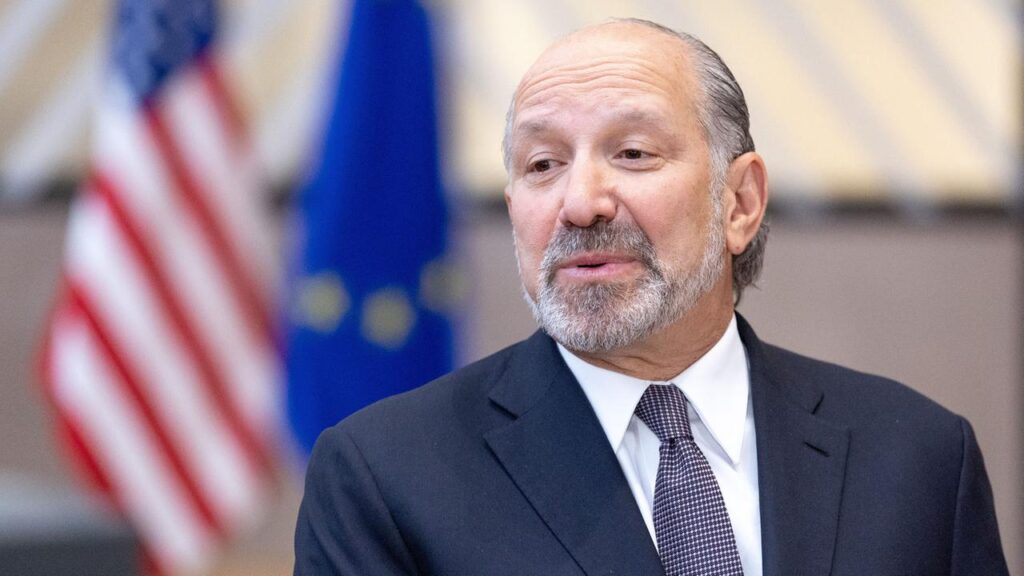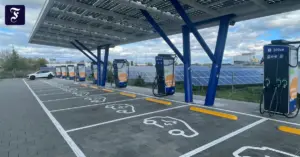
Lower steel tariffs to ease EU digital rules? US Commerce Secretary Lutnick indicated willingness to reach an agreement. EU Trade Commissioner Sefcovic made it clear: EU sovereignty law is non-negotiable.
US Commerce Secretary Howard Lutnick promised lower tariffs on steel and aluminum if the EU adjusts its digital rules. If responsible ministers in the EU can find a “balanced approach” with regard to EU digital rules, which I believe is possible, then we will work with them to address the steel and aluminum issue and find a solution, Lutnick said after the meeting in Brussels.
The EU, among other things, is a thorn in the side of the 50 percent import tariff that America imposes on steel and aluminum imports from the community of nations. This also put pressure on German industry. Recalling several proceedings by the EU Commission against US companies – including Google, Amazon, Apple and Microsoft – US President Donald Trump once again criticized the EU’s digital rules. The law on digital services (DSA) and digital markets (DMA) has come under particular criticism.
The US has significant concerns about this EU digital rules
“The United States has had significant concerns about the Digital Markets Act and similar legislation in the EU for many years,” said US Trade Representative Jamieson Greer in Brussels. Often American companies are affected, enforcement is sometimes aggressive and fines can be very high.
About a week ago, the EU Commission announced that it wanted to examine whether certain cloud services from American tech companies Amazon and Microsoft would have to comply with stricter European digital rules.
After US Minister Lutnick’s request, the commission immediately said: “Steel and digitalization have nothing to do with each other.” Steel has always been part of discussions with America. “Our sovereignty laws in the field of digitalization are non-negotiable.” EU Trade Commissioner Maros Sefcovic said after the meeting that EU law is not discriminatory and is not directed against US companies.
Reiche pushed for less regulation of technology
Federal Minister of Economy Katherina Reiche also took advantage of America’s visit to Brussels for private meetings. After conversations with representatives of the US government, the CDU politician advocated reducing technology regulations in the European Union and more use of artificial intelligence (AI or AI in English) in the German economy.
“Germany has made it clear that we want the opportunity to play in the digital world and apply AI in our industrial processes,” Reiche said. The German minister said it was not just America that was critical of Europe’s digital laws. “Without the application of AI models, there will be no good future,” he said. That’s why the federal government also traveled to Brussels to provide assistance. In particular, Reiche cites DSA and DMA as examples.
Lutnick is attractive with high investment
The US Commerce Secretary also promised the EU that American companies would invest a lot of money in the EU if the confederation of countries changed its digital laws. In the US, seven companies have each invested $500 billion to build data centers. “If the European Union finds a way to create balanced digital rules, I think the European Union could reach a trillion dollars in investment,” Lutnick said.
Mid-last week, the EU Commission presented a comprehensive digital package that also included weakening EU AI legislation. The proposal stipulates that some of the regulations can only be enforced later and AI companies will be allowed to access more data. Additionally, data protection laws must be changed. However, the DSA and DMA remain essentially unaffected by the Commission’s current proposals.
Deal months ago – details are still open
In the customs dispute between Brussels and Washington, there has actually been a basic agreement for months. But there are still open details about the controversial deal. Among other things, there is a struggle to implement the joint declaration published in August.
In the summer, EU Commission President Ursula von der Leyen and US President Trump agreed that a base tariff of 15 percent would apply to most EU imports to the US. Previously there were much higher taxes on the space. To achieve this goal, von der Leyen has promised, among other things, that the EU wants to buy $750 billion worth of US energy by the end of Trump’s term.
EU Trade Commissioner Sefcovic said the EU’s strategic energy purchases in the form of liquefied natural gas (LNG), nuclear energy and oil had reached $200 billion this year. The EU’s share of LNG imports from the US increased from 45 to 60 percent. In addition, EU investment in the US has also increased to around 150 billion euros since January.





